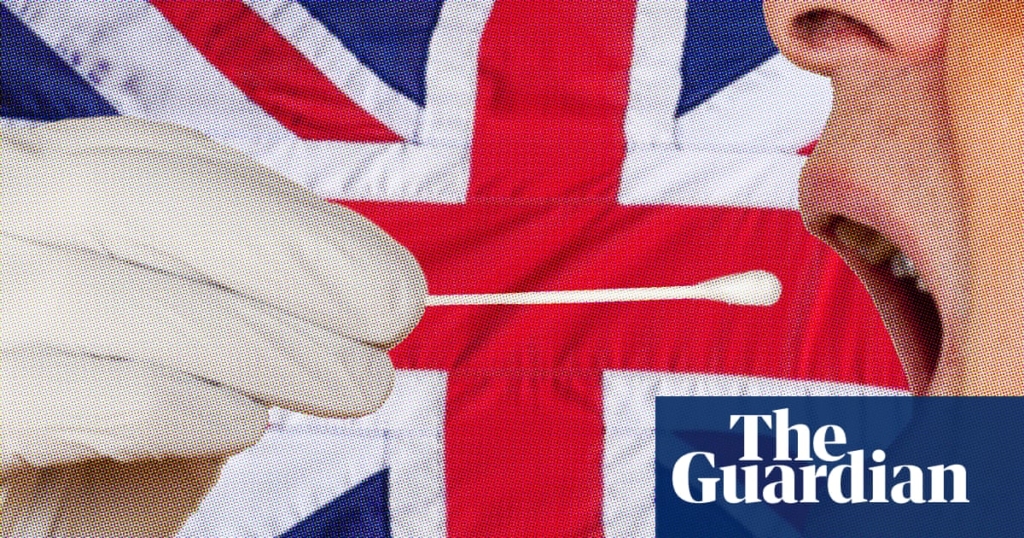Bu içerik, genetik test şirketi 23andMe’nin içinde bulunduğu sıkıntıları ve müşterilerinin DNA verilerini şirketin arşivlerinden silme çabalarını ele almaktadır. Yazar, kendi deneyimini paylaşarak genetik verilerini şirkete verme kararının ardındaki düşüncelerini açıklamaktadır. Ayrıca, genetik test sonuçlarının kişisel kimliğimizi nasıl etkilediği ve bu verilerin gizliliği konusundaki endişeler de ele alınmaktadır. 23andMe’nin geleceği ve toplanan verilerin akıbetiyle ilgili sorular da bu içeriğin odak noktalarından biridir. Son olarak, yazar, kendi genetik verilerini geri alma sürecinde yaşadığı deneyimleri ve bu verilere sahip olmanın gerçekten ne kadar faydalı olduğunu sorgulamaktadır.
[ad 1]
Kaynak: www.theguardian.com
23andMe is facing implosion. As the once-promising genetic testing company flounders – losing 98% of its $6bn value, all its independent board members, nearly half its staff – many of its 15 million customers are scrambling to delete their DNA data from the company’s archives. I am one of them.
My reluctant path to 23andMe began in 2016, when I ordered a kit in the mail. After letting the box sit on my desk for weeks, I finally spit in a tube and sent it to the company for analysis. I am a technology journalist – I like to think I am thoughtful about what data I share with corporations. When it comes to genetic data, which unlike a password or credit card number cannot ever be changed, I was particularly wary.
My father’s side of the family is meticulous about tracking our ancestry, with records that hold the name of the exact small village in Ireland our ancestors hail from. My mother’s side is less thorough. Although I know my grandmother’s great-grandparents came to the US from Denmark and spoke little English for much of their lives, I have no idea from what country our surname, Galusha, originates. I wanted to know more. So despite my misgivings – and there were many – my curiosity won out, and I sent in a test.
What did I get in exchange for handing the company $119 and indefinite access to my genetic data? Confirmation that I am 63% British and Irish, 17% Danish and otherwise “broadly north-western European”. I felt a resounding ambivalence about the results, including some disappointment that I had not discovered a newfound heritage – a piece of information that would give my identity new dimension. I was also surprised to find out that some parts of my identity present in the family lore – a Czech heritage – was not actually present in my genes. Now, as the looming collapse of the company raises serious concerns about what will happen to the database of users’ genomic information, I am struggling to reconcile the fact that I traded away my genetic privacy to find out that I am mostly British.
Timothy Caulfield, a professor at University of Alberta who has studied motivations for undergoing genetic ancestry testing and how consumer respond to their results, said my reaction – one of ambivalence – is actually the most common.
“We are told by pop culture that we are supposed to care – that your genes matter,” he said. “But a lot of people get their results and find it very underwhelming.”
In addition to finding my results inconsequential, I have always found the idea of genetic testing for ancestry to be fraught, and was hesitant to buy into the idea that my genetic origins have any bearing on who I am as a person. Caulfield, who had his own ancestry tested despite similar misgivings, is of the same mind. He asserts that race is “a biological fiction”, one that these companies promote, marketing the idea that our genes are relevant to how we view ourselves as individuals. This mindset, Caulfield says, is “the essence of racism”.
“On one hand, I am enraged by it – I think it is an incredibly harmful trend, especially in this polarized world that we live in, where we’re becoming more tribalistic,” he said. “But at the same time, I get it. People are looking for roots. They’re looking for meaning. They’re looking for a tribe to belong to. And I think the marketing plays into that idea.”
That marketing was wildly successful for the better part of two decades. 23andMe was co-founded in 2006 by Anne Wojcicki. By the time it went public in 2021, the company was worth $3.5bn, and its value reached a peak of $6bn shortly thereafter. Competitors like Ancestry.com and MyHeritage entered the sphere, and by 2024 more than 40 million people in the world had taken consumer genetic tests.
The individual appeal of these tests varies widely, but many consumers expressed an explicit desire to understand personal origins that inform their identities, said Muriel Leuenberger, a postdoctoral researcher at University of Zurich whose work centers on philosophy of identity and genealogy.
“One hope I see in people pursuing these tests is to develop a richer self-conception,” she said. “There is a thought that you get this information, and then suddenly things you did in the past or character traits that you have might fall into place and make sense in a different way that they haven’t before.”
For many people, those tests can reframe a sense of identity, for better or worse. Many have shared stories about a genetic test disproving longstanding family lore – like a long-cited story of Native American roots being negated, for example. I had always heard my family was Czech – a heritage that did not show up in any percentage in my results. This identity was not part of my upbringing beyond passing references, so discovering it did not exist make a huge impact on me. However, similar discoveries can lead to existential crises for those who have closely associated with a certain identity, said Leuenberger.
“For some, you have a whole cultural background with which you really identify, maybe it was even part of your upbringing, and suddenly you’re kind of cut off from it,” she said. “It can lead people to question this connection and whether they have a right to it if it is not proven by a genetic test.”
Such desires for certain cultural connections differ substantially by country, noted Caulfield – whose research found that in places like Canada and the US, consumers take tests hoping for an “exotic” background that aligns with the cultural understanding of our countries as a genetic melting pot. Black Americans have used genetic testing to trace a lineage violently fractured by the transatlantic slave trade, though some Black Americans have expressed concerns about privacy – as well as the ways in which DNA testing risks reifying racial stratification. In markets like China and Japan, he said, advertising campaigns instead seek to appeal to reaffirmation of ancestral purity.
after newsletter promotion
With the future of 23andMe in peril, the overarching question among previous customers now is what will happen to the data that has already been collected. Leuenberger noted that by entering DNA into a database, users sacrifice not only their own privacy but that of blood relatives. Because an individual’s DNA is similar in structure to that of their relatives, information about others can be gleaned from one person’s sample. This is especially pronounced with the rise of open-access DNA sites like GEDMatch, on which users can upload genetic data that can be compared to other samples. A consumer genealogy test contributed to the identification of serial killer Joseph James DeAngelo.
“What is ethically tricky with genetic data is that it’s not just about self-knowledge – it’s also knowledge about all of your relatives,” Leuenberger said. “Morally speaking, it is not necessarily information that is yours to give – and this risk is exacerbated if this company goes down and the fate of the data becomes more perilous.”
In an attempt to minimize these risks, I requested that my account be deleted and the company send me a copy of my data. I received an email confirming my deletion request – with some caveats. While samples I consented to have stored would be discarded, if I had opted into having my data used for research, that information could not be withdrawn or undone. Luckily, I had not. 23andMe and its genotyping labs are required under the federal Clinical Laboratory Improvement Amendments of 1988 and California laboratory regulations to retain my genetic information, date of birth and sex. In other words, the company is required to retain some portions of the information I am asking it to delete. The company will also retain “limited information” related to my deletion request.
23andMe declined to respond to questions regarding the nature of genetic information it is required to retain. In a statement, spokesperson Katie Watson cited 23andMe’s “strong customer privacy protections”, including not sharing customer data with third parties without customer consent. Many privacy concerns center around what will happen to the data if 23andMe changes ownership or goes bankrupt. Regarding those concerns, Watson noted that the company’s CEO, Wojcicki, has stated she intends to take the company private, and is not open to considering third party takeover proposals – thus maintaining the current privacy policy.
“We are committed to protecting customer data and are consistently focused on maintaining the privacy of our customers,” Watson said. “That will not change.”
As for my genetic data, I received a copy of my ancestry report – confirming my largely British heritage – and a 17MB text file containing my entire genome. While being able to receive such data is compulsory under many privacy laws, it raises the question of how useful reclaiming our data from tech companies really is, Caulfield said. Referencing a study conducted in 2020, he said consumers at a fundamental level feel they should have a right to their genomic information – even if they cannot understand the raw mass of millions of As, Cs, Ts and Gs.
“It is important to people to have a right to this data dump with their whole genome, even though for virtually every human on the planet it is meaningless,” Caulfield said.
So what will I do with my newfound understanding of self and long list of genotype identifiers sitting on my computer desktop? Nothing. I have traveled little in Europe, and thus have yet to visit any of my disparate homelands. Perhaps if I make my way over to London in the near future, I will be overwhelmed with a sense of belonging, and all my angst over who owns my genomic information will all be worth it. But I am doubtful that the tradeoff resulted in anything but a resounding ambivalence and the sacrifice of my genetic self.







Yorumlar kapalı.